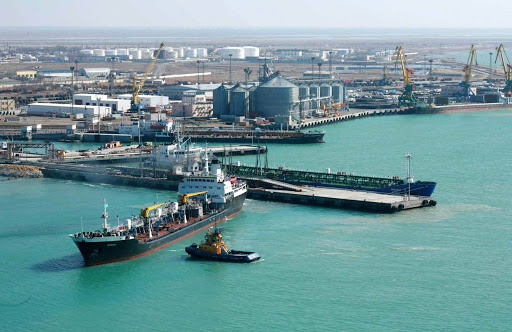Makhachkala, Russia (Ports Europe) February 6, 2023 – In 2022, Makhachkala Commercial Sea Port became the leader among Russian ports in the Caspian Sea in terms of growth in dry and general cargo transshipment. Every year it ships more and more grain, cement, and general cargo, mostly to and from Iran.
In 2023, the local media predicts a private investor for the port (an Iranian company is one option, the other is a large Russian logistic company).
Makhachkala is Russia’s only ice-free port in the Caspian Sea and the deepest of the three Russian Caspian ports (the other two are Astrakhan and Olya). Its dry cargo harbour combines berths for bulk cargo and containers, railway, car ferry and grain terminals. The port can receive and process about a thousand trains annually.
The first Russian railway ferry crossing in the Caspian was built in the port of Makhachkala in 2002 to provide direct rail links to the ports of Kazakhstan, Turkmenistan and Iran. The Port of Makhachkala has 9 berths, a cargo turnover of about 3 million tonnes per year; an oil harbour with a capacity of 5.5 million tonnes per year. The port has six own merchant ships.
Since February 24, 2022, when Russia invaded Ukraine and the west imposed sanctions on Moscow, the Swiss-Dutch oil trader Vitol has stopped shipping Turkmen oil to Russia. As a result, oil transshipment volumes in Makhachkala fell by 41%.
Makhachkala also has no cruise or passenger ships facilities. This is because in Kaspiysk, a satellite city of Makhachkala (located only 18 km southeast of it), is the Caspian base of Russian Navy.
Repair works in Makhachkala port
Urgent repair of decades old hydraulic structures started in Makhachkala in February. By mid-2023, seven berths will be repaired – six in the oil harbour and one near the grain terminal.
Some of the structures were inoperable due to severe corrosion and cracks, and are in disrepair. The pile foundations and sheet pile walls of the berths will be treated with anti-corrosion agents; all defective metal elements will be replaced.
At the grain berth, in addition to repairing corrosion-damaged elements of the base of technological platforms and mooring bollards, it is also necessary to replace the I-beam span, steel decking sheets and railings of transitional bridges.
The port
Makhachkala can handle vessels up to 150 m long and with a draft of up to 4.5 m. The port is a link in the transport system of southern Russia with the states of Central Asia, Iran, the Caucasus and other countries of the region.
Port infrastructure includes a dry cargo harbour with a transshipment complex with a capacity of 3 million tonnes per year, berths for general, bulk cargo and containers with a capacity of up to 1.2 million tonnes per year, a railway and car ferry terminal with a capacity of 1.3 million tonnes, a grain terminal with a capacity of 500,000 tonnes per year.
Makhachkala‘s growing importance
Makhachkala Port handled twice as much cement from Iran (over 218,000 tonnes) and exported 20% more grain (226,000 tonnes) to Iran in 2022 compared to the previous year.
The Russian government is pushing for development and improvements in its long-neglected Caspian Sea ports. The state contract on design and survey works for the construction of a new sea border crossing point in Makhachkala Port was signed in December 2022. The completion of construction works of the new check point is planned for 2026.
The new checkpoint is needed because of the growing cargo flow on the International North-South International Transport Corridor (INSTC) and the outdated infrastructure in the port.
Russian Caspian Sea ports are increasing their transshipment role. This is part of the official Russian trade policy to develop relations with Asian countries because European markets have virtually disappeared following Russia’s invasion of Ukraine. Moscow is also investing heavily in the dredging and repair of the Volga-Don Canal.
Some 450,000 tonnes of general cargo were handled by Makhachkala port in the first three weeks of 2023, 38% higher than in the same period of 2022, reflecting the redirection of Russian cargo flow from the north-west to the south-east.
More Ports Europe news about the Port of Makhachkala
Copyright (C) Ports Europe. All Rights Reserved. 2023.

